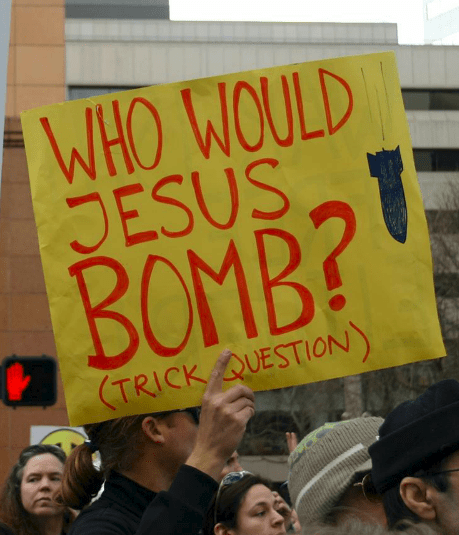Discerning Peace in the 21st Century – Part II

When the Peacemaking and International Relations Committee of the 222nd General Assembly was considering the Peace Discernment resolution (12-06) from the Advisory Committee on Social Witness Policy (ACSWP), they heard from many speakers. Understandably so, as this resolution is the final report that marks the culmination of a 6-year Peace Discernment process. The Peace Discernment process began in 2010, when the 219th General Assembly asked the PC(USA), on the 30th anniversary of “Peacemaking: The Believer’s Calling,” to social witness policy that founded the Presbyterian Peacemaking Program, to seek discernment for the future of our peacemaking efforts going forward. Resolution 12-06 focused on five affirmations about peace and peacemaking that were submitted and modified by the 221st General Assembly in 2014 and then sent to the presbyteries for discussion and vote. (Editor’s note: For a more information on that process, check out Geoff’s Peace Discernment Part I article.)
The resolution and report sponsored by ACSWP included some alternative wording of the five affirmations. As the committee was considering some of these alternatives that emphasized nonviolence, they decided it would be important to hear the perspective of those in the military. The committee requested that a military chaplain speak to the committee. The committee heard from the Rev. Larry Greenslit, the head of the Presbyterian Council for Chaplains and Military Personnel and a retired Navy chaplain. He opened his remarks by saying, “The mission of the U.S. military is peace; ultimately all we want is peace.”
___________________________________________
The Rev. Larry Greenslit, head of the Presbyterian Council for Chaplains and Military Personnel and a retired Navy chaplain, opened his remarks by saying, “The mission of the U.S. military is peace; ultimately all we want is peace.”
___________________________________________
His comments raise one of the conundrums of our conversations about war and peace. As Christian citizens of a nation that we love, we want to believe the best about our country, our national motives, and all the men and women who serve our country. And because we long for peace (and who doesn’t?), we believe that our motives and intentions are, if not pure, at least good. For many of us, any suggestion otherwise sounds unpatriotic and slanderous, even treasonous! The 60’s counter slogan, “America, love it or leave it” expresses some of this clash of ideals.
Yet I have to confess that when I heard the chaplain use the phrase “all we want is peace,” I thought of Mel Brooks’ satirical play, “Springtime for Hitler,” in which he sings:
 “I don’t want war! All I want is peace…peace…peace…!
“I don’t want war! All I want is peace…peace…peace…!
A little piece of Poland,
A little piece of France,
A little piece of Austria
And Hungary, perchance!
A little slice of Turkey
And all that that entails,
And then a bit of England, Scotland, Ireland and Wales!”
This poking fun at Hitler is comical exactly because it is so obvious that Hitler didn’t want peace. Indeed, it strains credulity for any nation, let alone one with our long history of slavery, genocide against the native populations, and interventions around the world to make such a claim. Anything more than a superficial reading of history brings us face to face with the reality that our nation’s motives have often been less than altruistic.
___________________________________________
Anything more than a superficial reading of history brings us face to face with the reality that our nation’s motives have often been less than altruistic.
___________________________________________
We might do well to remember just a few examples when we have failed to pursue peace:
- The Gulf of Tonkin incident, which President Johnson used as a pretext to escalate the war in Vietnam, never happened;
- The CIA helped to overthrow the first democratically elected prime minister of Iran, Mohammed Mosaddegh, in 1953 and installed the Shah in his place;
- The CIA overthrew the democratically elected government of Jacobo Arbenz in Guatemala in 1954 and replaced him with what became a series of brutal dictators;
- In 1973 the CIA orchestrated the overthrow of the democratically elected government of Salvador Allende in Chile and supported the dictatorial rule of General Pinochet in his stead;
- The U.S. supported the “dirty war” in Argentina which resulted in the death or disappearance of about 30,000 people;
- The U.S. has supported many tyrannical dictators and governments like the South African apartheid government and President Marcos of the Philippines;
- The U.S. helped to train many military commanders from the developing world at the School of the Americas in “counter-insurgency” tactics, leaders who have gone on to commit crimes against humanity;
- When Nicaragua overthrew their sadistic dictator, Anastasio Somoza, in 1979, we organized “Contra” mercenaries to terrorize the population and destabilize the government.
This list could be much longer. More recently, our invasion of Iraq was one of the most blatant violations of international law and crimes against peace since World War II. Not only did the pretext of Weapons of Mass Destruction (WMD) prove to be false, but some estimates of civilian casualties approach or even exceed one million, not including refugees fleeing for their lives and the virtual elimination of both the Jewish and Christian populations in that country.
___________________________________________
At the very least, we must be careful not to create national mythologies that obscure our ability to clearly see the log in our own eye before we remove the speck in the eye of our neighbors.
___________________________________________
This is not to say that our country has not achieved great and wonderful things around the world; indeed we have. We helped stop Hitler from taking over Europe; we helped to rebuild Europe with the Marshall Plan after World War II; we intervened to bring the war in Bosnia and Herzegovina to a negotiated end. This list could also be very long.

We have distributed tremendous amounts of food and medical aid and Peace Corp volunteers throughout the world. The ideals contained in our Declaration of Independence, our Constitution, and our Bill of Rights have inspired people all around the world. People from all over the world look to the United States as a beacon of freedom and democracy.
But we also have the largest military budget in the world and supply the world with more weapons of death than any other country. Our country is a complex smorgasbord of idealists and ideologues, altruism and utilitarianism, generosity and xenophobia. At the very least, we must be careful not to create national mythologies that obscure our ability to clearly see the log in our own eye before we remove the speck in the eye of our neighbors.
*****
AUTHOR BIO: Rev. Geoff Browning is the UCCM Campus Minister at Stanford University and the Peacemaking Advocate for the Presbytery of San Jose. He enjoys exploring the intersection of spirituality and social justice.
Read ACSWP Report 12-06: “Risking Peace in a Violent World: Five New Peacemaking Affirmations”.






Unbound Social